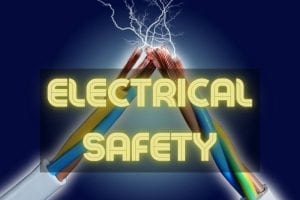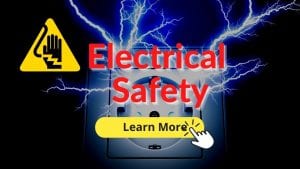When a Power outlets spark , It can be normal and not so normal!
We take electricity for granted and we also trust that the electrical components in our homes are safe and effective.
We can turn on a light switch and the light almost instantly turns on and we know we can leave a light burning for hours without any safety concerns.
When we do see a spark of electricity it is normal to feel concerned.
So, why do power outlets spark?
Sometimes it can happen when you turn on a switch or pull an appliance out of the wall socket. You can see a small blue spark and sometimes even feel a slight zap.
Normal Sparking
Now some sparks are totally normal and some sparks do require you call an electrician.
Firstly, lets understand why a spark can happen and why it is normal.
Your home is divided into different electrical circuits and electrical power loops through the circuits continuously.
A power point or power outlet is where an appliance can be plugged in to join the loop of electrical current that is running around your home.
Constant Supply Of Electricity
When the plug is pushed into the power point, there’s always a split second when the plug and power outlet is almost touching.
The electrical current can jump across that gap and sometimes it makes a spark and the same thing happens when you pull the cord out of the power point.
The electricity continues to flow until the prongs are completely pulled out of the outlet. There might be a spark occur as the prong is pulled out.
The unused electricity has to go somewhere and when it cannot find anywhere to go, it creates a spark.
This type of sparking is annoying and can even give you a tiny zap – But you can do things to minimise it
- Turn off the appliance before pulling the cord out of the socket.
- Don’t pull the plug out on an angle. It will likely cause a spark and you can damage the prongs.
- Don’t yank the cord out quickly.
When Does Sparking Need To Be Looked At?
There are four types of power point sparks that you shouldn’t ignore:
- Fizzle sparks. A normal spark will be a quick blue flash. One that fizzles and lingers is a sign there is a problem.
- Large sparks. If visible sparks are coming out of the power point. Call an electrician immediately
- Yellow or white sparks. A normal spark as discussed above, are blue in colour. Yellow or white are not typical spark colours so please seek licensed advice.
- Burning sparks. If a spark is followed by the smell of smoke or melting plastic, you may have an immediate problem and should immediately shut off the outlet at the circuit panel. Call an electrician. There maybe something wrong with the power outlet or the appliance may have a faulty cord, Either way you could have an electrical fire on your hands if you do not seek advice.
What Causes The Electrical Sparking?
There are a few reasons why dangerous sparking can occur:
- Short circuiting. If a power outlet’s wires are touching each other and can cause a short circuit. This causes significant heat which can cause a fire.
- Water. There may be a leak within your walls, or perhaps the power point has had direct water contact ( being splashed or flooding) You will need to call an electrician if you suspect internal water leaking and also call a plumber.
- Overloading. The more appliances and devices you have plugged into a power point the greater the potential for sparking. Spread your appliances out safely and use other power points. If your home does not have enough, then call an electrician to install more outlets in the areas you need.
- Old power points. It is recommended that they be replaced every 20 years or so.
If there is visible damage like a crack or the switch has come loose, get this seen to faster.
Repeated use over time, will cause the electrical wiring inside your outlets can wear out. Eventually the entire circuit in the home will need to be rewired along with replacing the power outlets. - Improper repairs. If you see sparking in an outlet that was installed or repaired by someone who lacks the required licensing and certifications. You should have the work inspected and repaired by a licensed electrician.
It Might Be Tempting To DIY Electrical Work
Trying to Do-It-Yourself is great for many household repairs, but professional help is required for anything electrical.
Doing illegal DIY electrical work, apart from looking terrible in appearance, can be truly dangerous to all inhabitants of the home.
Many house fires are caused by electrical safety problems.
Licensed Electricians and Licensed Electrical Inspectors are the only people who can authoritatively inspect wiring, and only Licensed Electricians can fix faulty electrical problems
Australian Electrical standards
The main standard to which all electrical installations including those in domestic dwellings adhere is the Australian Standard AS/NZS 3000:2007 (referred to as the Australian / New Zealand Wiring Rules), including amendments. The requirements of AS/NZS 3000:2007 are strict for very good reasons and each state has there own standards and inspectors

Don’t Risk Your Home
Did you know that your home insurance policy will also require that all electrical work be conducted by a licensed and insured electrician?
In the event of a fire or accident, if the cause was linked to electrical work which wasn’t completed by a licensed electrician. Your home insurance policy could potentially be void.
This will leave you uncovered and out of pocket if something happens to your home.
Call In Professional Electricians
Some of the key electrical services offered by Brisbane Electricians include but is not limited to;
- Air Conditioner Installation
- Electrical Wiring for new homes
- Security system installation
- Test and Tag for your appliances
- Residential wiring repair and installation
Our Team of Brisbane electricians are on standby to ensure your home is safe from electrical faults.
The Article When Power Outlets Spark First Appeared ON
: https://gqcentral.co.uk

No responses yet